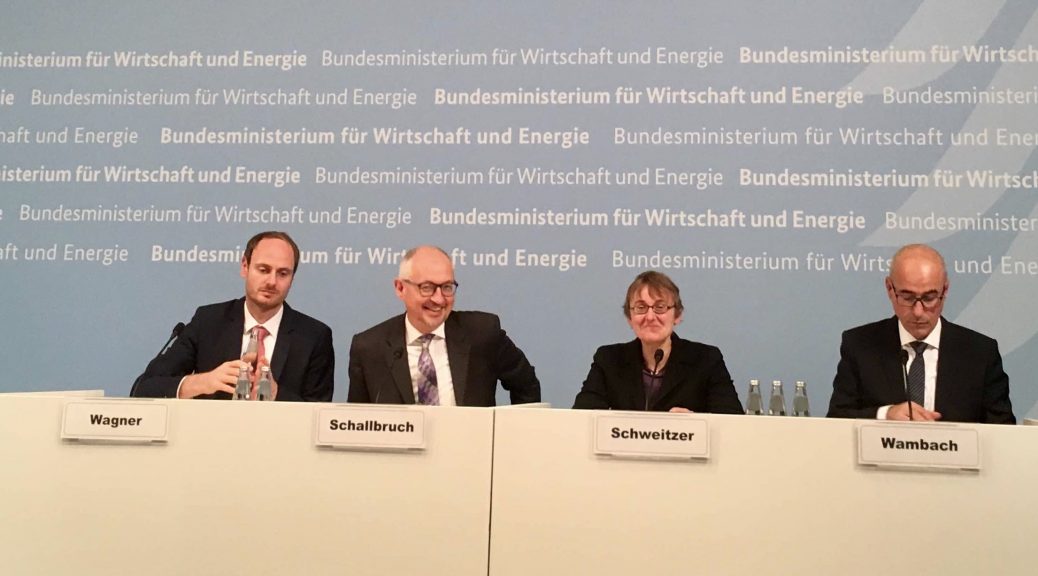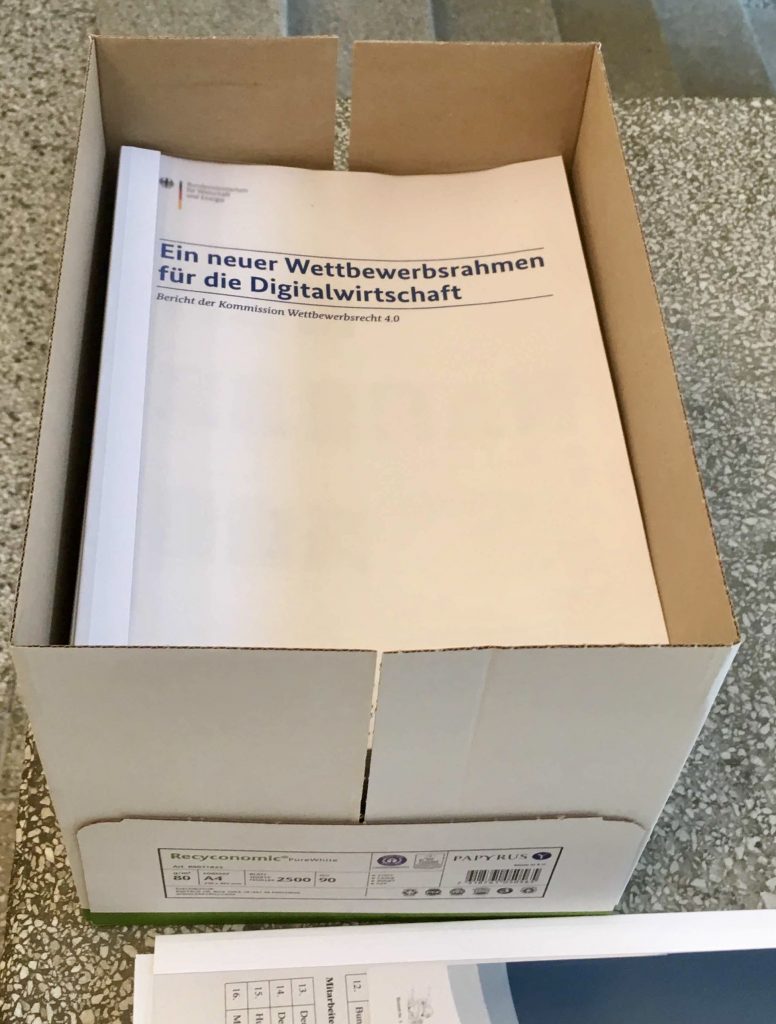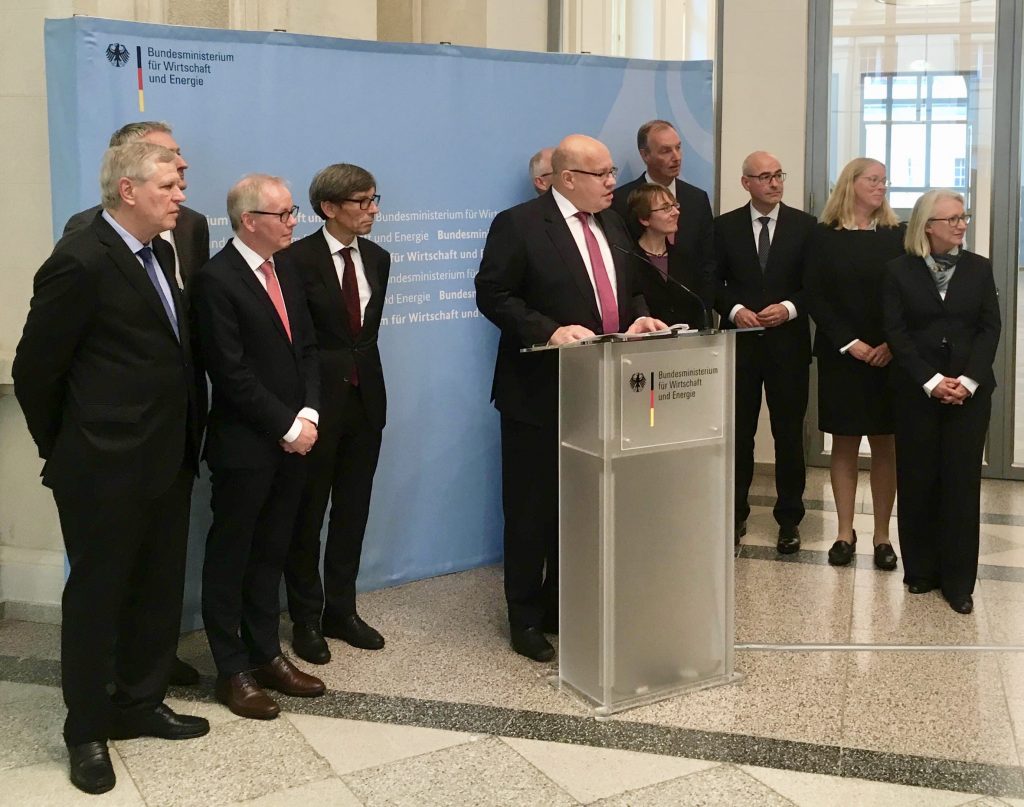
Competition 4.0
In Berlin, the German Commission for a Digital Competition Law (“Kommission Wettbewerbsrecht 4.0”) handed over its proposals for the reform of the EU competition framework to German Economics Minister Peter Altmaier. The task of the expert group was to recommend changes of EU law. Lucas Gasser was at the press conference for D’Kart and gives a first overview of the German contribution to the Eurovision Competition Contest.
Almost a year has passed since Germany’s Minister Peter Altmaier appointed an expert commission to review the European competition law framework in the digital age. The group, chaired by Martin Schallbruch, Heike Schweitzer and Achim Wambach, was asked to draw up recommendations for the further development of European competition law by autumn 2019. Just in time, actually on the very day when Ursula von der Leyen presented her nominees for the future Commission Cabinet in Brussels, the interdisciplinary “Commission 4.0” delivered its results to Altmaier in the form of an 85-page report (the link goes to an English press release by the Ministry, the report is available in German only at present).
EU, not GWB; concrete, not abstract
As was stressed several times during the presentation of this report, the work of this Commission was not directly related to the forthcoming 10th amendment of the German competition act (GWB). Thus the three chairpersons – according to their own statements – were asked not to speak in the press conference about the 10th amendment. At least, Heike Schweitzer disclosed that the relevant people from the Ministry had been present during the meetings of the commission and had eagerly taken notes.

Schweitzer, a professor at Humboldt University Berlin, had only recently delivered a well-known report as a special adviser to Commissioner Vestager (together with Jacques Crémer and Yves-Alexandre de Montjoye). The new report is driven by the fact that Germany will take over the EU Presidency in the second half of 2020, for which some concrete proposals for legislative measures seem to be needed. The present report is therefore intended to outline what the new European Commission will then work on. The report from Berlin becomes more concrete on some points where the report for Brussels had only pointed at problems.
The mission
In his description of the commission, Minister Altmaier had made it quite clear in 2018 what it was actually all about: “To secure and preserve Europe’s position and competitiveness in digital markets […] and thus at the same time economic and social prosperity”. In view of the dominance of American and Chinese platform operators in the digital sector, European competition law is to be modernised and its legal basis in the digital sector “harmonised and merged”. Heike Schweitzer summed it up by saying that, on the one hand, the taming of Google, Amazon & Co. is still lacking and, on the other hand, the European digital economy must be promoted in order to catch up with the established giants. The “Commission 4.0” set itself the goal of presenting long-term and sustainable solutions. In terms of content, three thematic blocks were formed, each of which was worked on by a working group under the leadership of one of the chairpersons. Achim Wambach, an economics professor who heads the Monopolies Commission in Germany, and his team took care of digital platforms, Martin Schallbruch, an IT expert and former government official, and his team dealt with the role of data and Heike Schweitzer took “the rest”.
The result is 22 recommendations, some of which – in the case of implementation – can be described as actually very extensive and, above all, concrete. Six categories can be distinguished.
1: Adjustment of market definition
The Commission proposes to work on the methodology of market definition for digital markets. Accordingly, the European Commission is to revise the 1997 notice on the definition of the relevant market. In addition, a separate Communication on market definition and market power in digital platforms should be published. In this respect, the Bundeskartellamt has already summarised both its practice and that of the Commission in a working paper in 2016. The EU Commission would already have a template for the implementation of this recommendation.

2: Handling of data
According to the expert commission, access to data is a source of innovation and competitive opportunities. However, ideas such as those considered by the German Social Democrats, in particular, in their “Data for all” initiative seem premature. At any rate, a cross-sector regulation does not seem to be feasible at present. However, a framework directive is recommended with principles under which conditions users should be allowed to provide third parties with access to their user accounts. This is modelled on the Second Payment Services Directive (PSD II), which allows account holders to give others access to their accounts.
The Commission of Experts otherwise proposes more cautious steps. The most far-reaching of these would probably be the establishment of data trustees to manage the provision of data for those affected. Although the ideas announced by Martin Schallbruch in the press conference for such institutions sounded quite concrete, the Commission only recommends the “investigation of possibilities of establishing” in the report.
More concrete recommendations relate to the use and provision of public sector information (PSI). For example, data received by the public sector within the framework of services of general interest should be made available to third parties (“open data”). To this end, the experts recommend that a data strategy be drawn up at European level which sets out a concept for the cross-sector collection, use and provision of PSI. The UK “Open Data Institute” is seen as a possible model.
There is also a side blow towards data protection authorities: the fragmentation of data protection in Germany, where the Länder organise data protection, is to be eliminated in favour of a central authority.
3: Tougher control of powerful incumbent platforms
With regard to the stronger taming of established platforms with market power, the Commission of Experts (“in majority”) proposes the creation of a European Platform Regulation – and of course a fact-finding mission on “cross-market foreclosure strategies in the digital economy”. In order to be an addressee of the planned regulation, absolute minimum revenues or user numbers must be achieved in addition to the market dominance criterion. This is probably intended to ensure that only Google, Amazon & Co. are really covered by the regulation.
In essence, the Regulation may have three rules of conduct for platforms:
The first is a ban on self-preferencing in relation to third-party providers. This concerns so-called hybrid platforms which both offer the platform intermediation service and provide goods and services themselves. The best example of this is Amazon, which on the one hand operates the Amazon marketplace and on the other also acts as a trader of certain goods. The case recently opened by the Commission against Amazon also deals with this problem. There is the accusation that Amazon prefers its own dealer activity on the Amazon marketplace by favouring itself in the selection of the so-called BuyBox dealer. The P2B Regulation, which came into force on 11.07.2019, requires digital platforms to disclose such selection and ranking processes. The expert commission’s proposal goes beyond this transparency requirement and would make concrete demands on the selection and ranking process.
In addition, a Platform Regulation should oblige the addressees to enable the portability of user and usage data in real time and in an interoperable data format, and to guarantee interoperability with complementary services. Achim Wambach discussed this using the example of navigation instruments or music streaming services. When switching cars, it should be possible from one day to the other to access information such as last visited destinations and the like in the new car (from another manufacturer). The same should apply to your own playlists. A change of supplier should not lead to their loss. And all this at a speed that does not result in a noticeable transition period.

Finally, the established platforms are to be obliged to set up alternative dispute resolution procedures for disputes over content and items offered via the platform. It is primarily a question of responsibility for breaches of obligations and rights by users of a platform. The experts reject any general liability on the part of the platforms. In the report, they explicitly refer to possible infringements of intellectual property and content that go beyond the limits of freedom of expression protected by fundamental rights. In their view, the establishment of dispute resolution bodies on established platforms could counter the risk of censorship in the form of overblocking. According to the report, the competitive relevance arises in particular from the fact that market-dominating platforms as “rule-setters” also have a “special obligation” vis-à-vis users to ensure undistorted competition between users.
In addition to the recommendations for action to strengthen the control of dominant platforms, the “Commission 4.0” has also issued two recommendations what not to do. This concerns the merger activities of established platforms. At present, the Commission advises against reforming the thresholds of the Merger Regulation – for example into the direction of a transaction volume based threshold as in Germany. They also reject the idea of a system of (additional) ex-post control of mergers. The ideas came up with regard to the systematic acquisition of innovative start-ups by established platforms, the competitive relevance of which only becomes clear in the aftermath of a merger (“killer acquisitions”). An observation of the phenomenon and reports to the Council and the Parliament should suffice for the time being.
However, the Commission recommends the development of guidelines for a more concrete application of the SIEC test when innovative start-ups are purchased by established platforms. Particular attention should be paid to “data-based, innovation-based and conglomerate theories of harm”.
4: Legal certainty for cooperation
Following the hearing of many European digital companies, the Commission came to the conclusion that legal certainty is required for cases of cooperation in the digital sector, e.g. with regard to data pooling. The EU Commission should make this a priority. And to this end, the Commission recommends the establishment of a voluntary filing procedure with the EU Commission, under which companies can have digital cooperations tested and receive a legally binding decision (or comfort letter?) within a short period of time. The experts thus propose a partial return to the system of exemption procedures that was actually abandoned with the introduction of Regulation 1/2003. As they point out, this project can probably only be achieved with a considerable increase in the staff of the Directorate-General for Competition.
5: Recommendations for changes in procedural law
In procedural law, the Commission does not propose any legislative change. They discussed a reform of the provisional measures (Art. 8 Regulation 1/2003). Yet, instead of legislative intervention, the “Commission 4.0” calls on the EU Commission to proactively examine the use of such measures on a case-by-case basis in the future. In this context, Heike Schweitzer highlighted the Commission’s action in the proceedings against US chip manufacturer Broadcom. In this case, Team Vestager had brought up interim measures for fear that a later decision could “go nowhere” due to the fast-moving nature of the markets concerned.
6: Recommendations for institutional changes
The Commission has also considered institutional adjustments to competition law. This resulted in two recommendations. The first is aimed at better coordination of the EU Commission’s various policy areas. To this end, a Digital Markets Board is recommended at the General Secretariat.
In addition, an EU agency to accompany the digitisation of markets (Digital Markets Transformation Agency) could be set up on a temporary basis. It would support the Digital Markets Board and collect and process information on market developments and technical developments. In addition, this agency could set up and coordinate a network of the corresponding member state institutions.
The next steps
The publication or entry into force of guidelines, communications and regulations is generally preceded by a long-term consultation or legislative process. The establishment of an EU agency also and above all takes time. In summary, it is therefore unlikely that the recommendations of the German Commission can be implemented too quickly. Nevertheless, the ambitious recommendations are already providing support – albeit only on a more psychological basis – for the Directorate-General for Competition in the ongoing proceedings against Google and Amazon.

Lucas Gasser is a doctoral student of professor Rupprecht Podszun and a research assistant at the Chair of Civil, Commercial and Economic Law (Professor Tobias Lettl) at the University of Potsdam.
2 thoughts on “Competition 4.0”